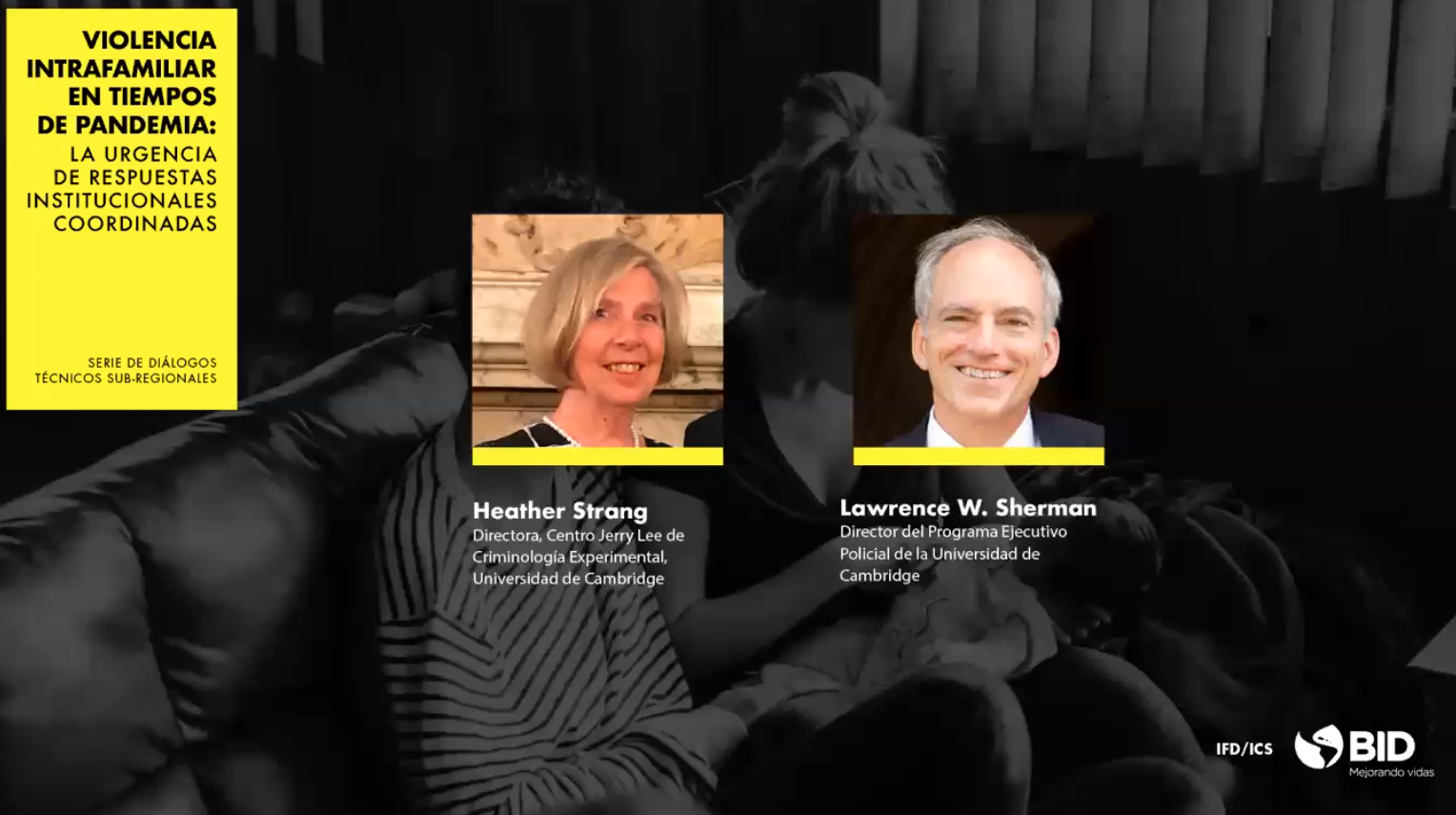News
New Criminal Network Analysis Course!
We are excited to open bookings for the Criminal Network Analysis Course in Cambridge from 4th - 8th April 2022.
Click here for more information.
Cambridge EBP Conference 2021
You can revisit the whole conference held in Cambridge between 12th and 14th July 2021 here.
Cambridge Centre Advice to Biden
New York Times article - Biden’s Honeymoon is Over, and He Knows It.
Happy 1st Birthday!
Our online short courses have been running for a year! To help us celebrate, enjoy 15% off both courses until 31st July 2021.
The Future of Democratic Policing - Darwin College, Cambridge
Watch this lecture given by Professor Sherman at Darwin College, Cambridge here
WIRED Article on ‘The radical idea to reduce crime by policing less, not more’
Sherman and others from the Centre’s team feature in this article.
Lawrence Sherman 'The Future of Democratic Policing', Darwin alumni talk
Watch the full video here.
Evidence-Based Policing: ‘The EVIDENCE will move You’ Virtual Conference
17-19th February 2021. More information here.
Partnership between the Centre and the OACP
Ontario Association of Chiefs of Police and U.K.’s Cambridge Centre for Evidence-Based Policing Forge Partnership to Promote Evidence-Based Policing. Read
How Big Data improves police effectiveness
Lawrence Sherman talks about Big Data analysis and tracking in policing, evidence-based policing, the “defund the police” movement, and so much more. Watch the interview here.
Cambridge graduate publishes research on reducing repeat offending in Victoria, Australia
Cambridge MSt graduate David Cowan, a Superintendent in Victoria Police, Australia, finds diversion can lead to reduced crime rates. Read full article here.
Cambridge Graduate publishes crucial new article on the victim-offender overlap
This research shows how combining records of victimization and offending to target higher harm levels can lead to greater potential benefits for police investments in harm reduction and prevention. Read full article here.
Cambridge Crime Harm Index webinar
The replay of this live webinar can now be viewed here
Sherman speaks about identifying rogue cops before they act
Professor Sherman was interviewed for BBC Sounds on how to identify rogue cops before things go wrong. Listen to the programme here.
Sherman talks about the Crime Harm Index and the Triple T on crime analysis podcast
Listen to the full interview here.
Cambridge graduates awarded prestigious recognition
Two Superintendents from Australia Read More
Cambridge MSt Graduate receives prestigious international police award
May-Britt V. R. Ronnebro is Superintendent and Senior Advisor on Crime Prevention at the Swedish National Police with 44 years’ experience of policing… Read More
Modern slaves on cannabis farms ‘are being failed by police’
A Criminology MSt student from the University of Cambridge found that police often do not see the bigger picture. Read the full Times article here.
The Evidence-Based Investigative Tool (EBIT) successfully predicts almost all eligible cases that were ultimately solved.
EBIT is a multi-stage case review system developed by CCEBP and Kent Police (UK) to improve the use of investigative resource. It does this by identifying solvable cases early, while also screening for public interest factors important to maintaining legitimacy. Read full article here.
Sherman delivers short talk on Predictive Policing of Police
Cambridge Crime Harm Index Applied in Portugal
Launch of The Cambridge Online EBP Leaders’ Short Course
Policing To Reduce Serious Violence - the Centre’s first online course is now available. It perfectly navigates travel as well as resource restrictions by being 100% online yet also offers unprecedented personal supervision in the form of 4 one-to-one online sessions with a tutor. To find out more about the course, click here.
Lawrence Sherman speaks to Australian National Radio about predictive policing of the police
How we can use Big Data to predict and prevent lethal force by police. You can listen to this radio interview here.
Sherman gives global webinar on American Policing
Lawrence Sherman discusses UK & US police responses to protests on NPR
Read the short article here.
Cambridge teachings translated into practice with London’s violent offenders
Met Commander Alex Murray, a Cambridge MSt graduate, is using a focused deterrence method, the kind that is being taught to analysts and leaders at the Centre, to engage with violent offenders whilst they’re on lockdown and speak to them, in person, about what kind of future they want. Read the Times article here.
Cambridge MSt Graduate chairs first multi-national seminar on COVID-19 and Family Harm
A world-first collaboration of SEBPs has seen police officers and staff, researchers and supporters of Evidence Based Policing from the UK, Australia, New Zealand, America and Canada come together to look at policing challenges that impact across the globe. More now than ever before, policing needs to be evidence based, and to make strategic policy and operational decisions that are informed and underpinned by the best available evidence. The seminar was chaired by Met Commander Alex Murray, an MSt graduate of Professor Sherman’s. Alex also founded the very first Society of Evidence Based Policing in 2010.
iSEBP Command Information for Police Leaders: Family Harm PDF
Watch the full seminar:
Cambridge Centre Offers Domestic Abuse Strategy: video
150 senior police and cabinet ministers from major Latin American countries heard Cambridge Centre’s Heather Strang and Lawrence Sherman speak for 20 minutes in early May about a COVID-driven strategy for policing domestic abuse. Watch the video below.
University of Cambridge Press Release
16 January 2020
Police platform patrols create ‘phantom effect’ that cuts crime in London Underground
A major experiment introducing proactive policing to Underground platforms finds that short bursts of patrolling create a ‘phantom effect’: 97% of the resulting crime reduction was during periods when police were not actually present.
Read the University of Cambridge press release here.
The academic article is published in the journal Criminology. Read here.
Podcast
20 November 2019
Follow Jerry Ratcliffe’s Reducing Crime podcast here.
Episode 17 welcomed Professor Lawrence W. Sherman for a discussion of algorithms in policing, among other topics.
The Episode is available on:
Stockholm Prize in Criminology 2020
08 November 2019
The Stockholm Prize in Criminology is a prestigious international award. The Prize is awarded for outstanding achievements in criminological research or for the application of research results by practitioners for the reduction of crime and the advancement of human rights.
The 2020 Stockholm Prize in Criminology lauds Philip J. Cook, Duke University, Durham, USA and Franklin E. Zimring, University of California at Berkeley, USA for their evidence-based explanations of gun policy effects. Read more.
Watch the announcement of the 2020 winners of the Stockholm Prize in Criminology here.
Read the press release in English and Spanish here.
New Issue Available
08 November 2019
The new Issue of the Cambridge Journal of Evidence-Based Policing is available here. It includes the following articles:
Lawrence W. Sherman on ‘Burying the “Power Few”: Language and Resistance to Evidence-Based Policing.’
Ashley Liggins, Jerry Ratcliffe & Matthew Bland on ‘Targeting the Most Harmful Offenders for an English Police Agency: Continuity and Change of Membership in the “Felonious Few”.’
Keith Surtees, Justice Tankebe & Matthew Bland on ‘Tracking Kidnappings in London: Offenders, Victims and Motives.’
David Cowan, Heather Strang, Lawrence W. Sherman & Sara Valdebenito Munoz on ‘Reducing Repeat Offending Through Less Prosecution in Victoria, Australia: Opportunities for Increased Diversion of Offenders.’
































